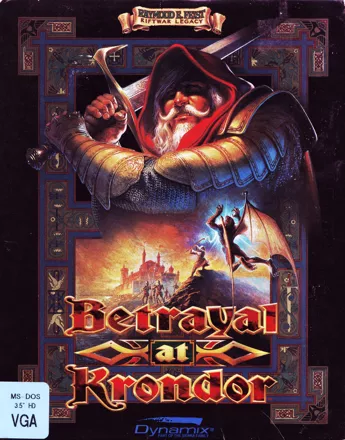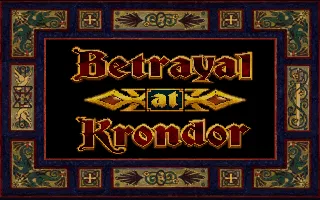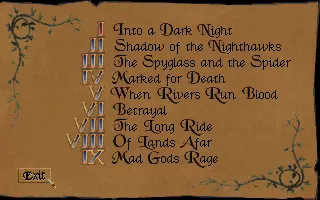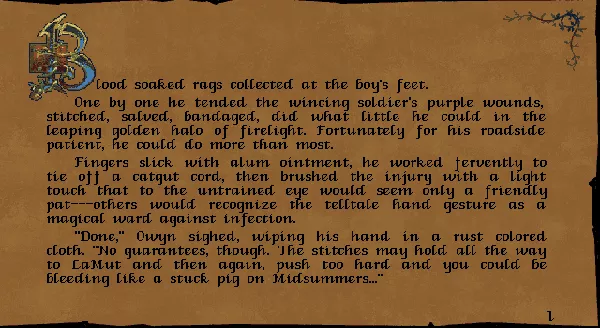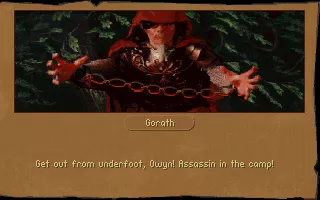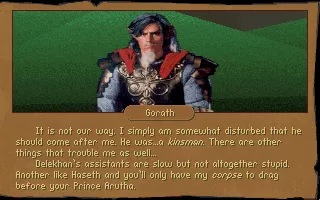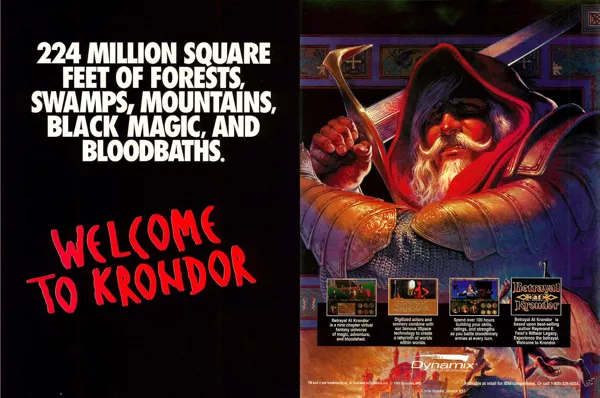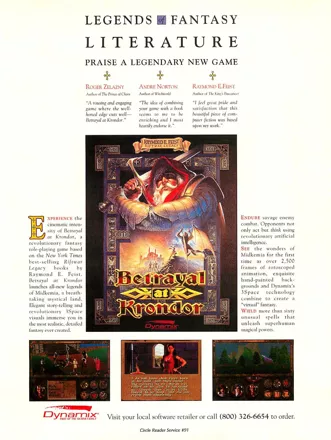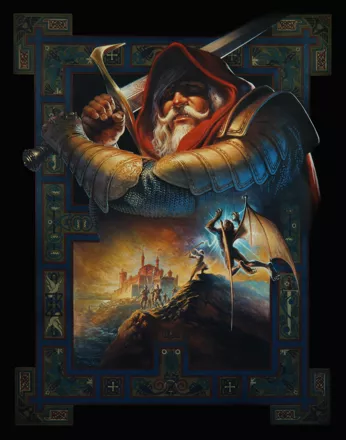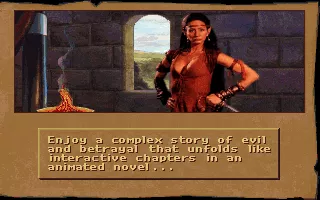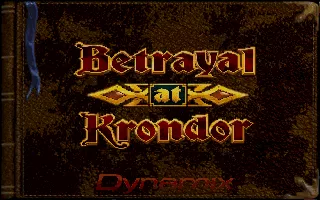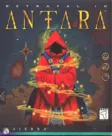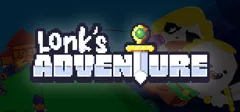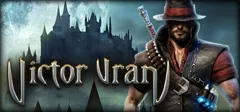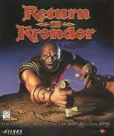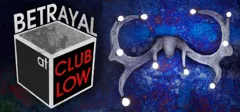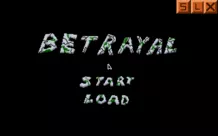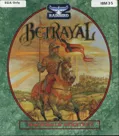Betrayal at Krondor
Description official descriptions
Based on Raymond E. Feist's Riftwar saga (and co-written by Feist himself), Betrayal at Krondor is a medieval fantasy-themed role-playing game set in the Riftwar universe.
The story begins as Gorath, a moredhel (dark elf) renegade, who intended to warn the people of Krondor of the upcoming moredhel invasion, is attacked by an assassin. Locklear, a nobleman who serves the crown of Krondor, and a young magician named Owyn decide to accompany Gorath to Krondor, where they'll have to think of a plan to stop the moredhel leader Delekhan.
The game's story is divided into nine chapters. Each chapter has a goal to achieve before moving on to the next one, but the player is given considerable freedom to explore the vast world of the game and undertake side quests. Gorath, Locklear, and Owyn are the first party of characters the player controls; however, characters may leave and others may join the party later, as dictated by the events of the story.
Exploration in Betrayal at Krondor takes place in a 3D world viewed from first-person perspective. Towns, however, are presented as a series of still screens representing locations (temple, tavern, inn, etc.). Combat takes place on separate grid-based screens. The player moves the characters on these screens in a turn-based fashion, attacking physically, defending, and casting spells.
Only two character classes are present in the game: fighters and magicians. Fighters use swords or crossbows (for long-ranged attacks); magicians can fight with staves, or cast spells. Characters have four attributes: health, strength, speed, and stamina. The latter is depleted when a character uses weapons or casts magic. The role-playing system of the game relies on skills. Each character has a set of skills, ranging from weapon proficiencies to abilities such as bartering or stealth. Skills improve after continuous usage. The player can "emphasize" a skill in order to make it improve faster.
Spellings
- קרונדור - Hebrew spelling
- 叛變克朗多 - Chinese spelling (traditional)
Groups +
Screenshots
Promos
Videos
Add Trailer or Gameplay Video +1 point
See any errors or missing info for this game?
You can submit a correction, contribute trivia, add to a game group, add a related site or alternate title.
Credits (DOS version)
153 People (109 developers, 44 thanks) · View all
| Design | |
| Lead Programming | |
| Programming | |
| Graphics / 3D Programming | |
| Level / Scenario Design | |
| Graphics / Artwork | |
| Music | |
| Art Director | |
| Cover Art | |
| Documentation | |
| Director | |
| Writing / Dialogue / Story | |
| Playtesting | |
| [ full credits ] | |
Reviews
Critics
Average score: 84% (based on 16 ratings)
Players
Average score: 3.9 out of 5 (based on 102 ratings with 12 reviews)
Riftworld is done justice, thanks to Sierra and Mr. Feist.
The Good
I played the re-release of the game for Windows, with the Redbook music added, and the music was stellar. Rarely has a game's music matched the action so well. In addition, the storyline to the game was strong; you could tell a professional writer (i.e. Raymond Feist) had a hand in the production of this gem. The characters were fleshed-out, the events in the game were logical, and the game flowed evenly like a book, even organized into chapters like one. The chest-opening sequences were well done, with riddles that added to the charm of this title. Finally, the combat sequences were the perfect touch for a slow-moving story such as this one; the turn-based combat was very reminiscent of chess, and the challenges were neither too easy nor too hard.
The Bad
The graphics were pixellated, and the game's slow pace could become a bit exasperating at times. Also, the character of Pug looked nothing at all like the character was described in the book.
The Bottom Line
This would be a good game to those who truly enjoy a long rpg with strong story elements and turn-based combat. Also, if you are a Raymond Feist fan, you should pick this up. For those who enjoy hack 'n slash type games, however, or for those who prefer a more console-type action-filled rpg, they should not bother with this title. This is a true classic, and a textbook definition of what a true computer role-playing game is.
DOS · by Daniel Reed (28) · 2002
The Good
I love how easily you are immersed into the world of Midkemia and the lives of the characters. Gorath and Owyn are still my favourite characters from Feist's novels, years after I first played the game.
The Bad
The ending. Something bad happens to one of the characters I was very fond of.
There is a major bug - if you cast Final Rest on a dead Nighthawk/Black Slayer while another character or enemy is standing upon the same tile the dead enemy is on, the unlucky soul is sucked away with the dead Nighthawk and the game becomes frozen.
The Bottom Line
I loved the game. The storybook elements, puzzles and riddles, and the characters themselves make the game well worthwhile.
DOS · by Jaymie Rogers (1) · 2013
Decent role-playing game with some nasty flaws
The Good
Krondor had some features that were very innovative for its time and I wish more games of today would use. The inventory system was simple and polished, with excellent descriptions for every item that could be found.You could move around using the helpful overhead map and use a yet larger map to see your position in the world.
The world was polygonal with sprites used for objects such as trees. For the time the game was made this was rather good technology, and although it is in no way passable by today's standards, it isn't all that jarring to have to play with.
There are no loading times anywhere in the game as you travel around the world, except when a chapter switches. This is a big bonus-- while loading screens from this era on today's computers would likely blink by in a second anyways, it is far nicer to simply be able to travel about the world unhampered by them.
Combat is fun and has a great system. Instead of the usual battlefield you will see appear in RPGs that don't have real-time combat, the game sets the battlefield as whatever area you encountered enemies on, which makes it seem a lot more realistic. The area is turned into a grid battlefield with the party at one end and the enemies at another.
The Bad
First of all, the artwork comes to mind. Instead of hand-drawn art, which is always the best, the characters appear to have been video captured, which never seems to work with a low-res game such as Krondor. Not only that, but the characters generally look horrible-- wizards look like farmers in bathrobes, knights like farm hands with pots over their heads, etc. It is often painful to have to see a character picture as dialogue progresses.
Furthermore, there are some problems with the game engine. The camera is 'drawn out' from the screen so that it takes two times as long to rotate 360 than it should. You can speed up rotation, but this only makes the effect more dizzying. It's very weird to see what looks like 720 degrees of landscape go by as you turn around.
The game's major strength was supposed to be that it was set in Raymond E. Feist's 'Riftwar Legacy' series. Personally, I am no big fan of his works-- I have read a few books in the series and found them to be devoid of character depth, lacking in intelligent narration, and set in an utterly typical fantasy world. The game is no different. The story for this game is no better than that of any other RPG, and it's no worse than any of Fiest's books-- which I think says a lot about the quality of the series. Enough on that point, however; put simply, the story for this game is nothing special, and I have encountered far better in the likes of Daggerfall.
Another minor issue is that the day passes too fast; one day seems to be equivinant of a natural game hour. If the designers needed it to take longer to get between places, they could have just streched the whole world making it three times as large, or made the character's steps smaller-- the way it is in the final product is totally unreal.
The Bottom Line
Since it was released as freeware by Sierra a long while ago, Krondor is worth the time to find and download. Unless you're a fan of Feist's work, however, don't expect anything special.
DOS · by ShadowShrike (277) · 2003
Discussion
| Subject | By | Date |
|---|---|---|
| A flood of nostalgia | St. Martyne (3648) | Mar 1, 2010 |
| CD and Floppy | Unicorn Lynx (181780) | Aug 10, 2009 |
| GameTap | SharkD (425) | Sep 10, 2008 |
| Translating BaK? | Ajan (262) | Jul 6, 2007 |
Trivia
Actors
The actors for the pseudo-video and motion capture don't look remotely like they're described by Raymond E. Feist, and some (such as Pug) are downright contradictory.
CD-ROM version
The CD-ROM enhanced version of the game includes additional goodies: * 5-minute interview with Feist * Windows-based hint system * Redbook audio soundtrack
Freeware release
Sierra has released the game for free as promotion for its two sequels. This offer only lasted for a limited time, though. The version which was obtainable through on the Sierra website was buggy and needed a patch to get it working correctly.
Novel
Raymond E. Feist, the author whose Riftwar books Betrayal at Krondor is based on, has actually written a book based on the game entitled Krondor: The Betrayal, the first part of a new series called The Riftwar Legacy. The book has the same basic plot as the game, but of course has been altered somewhat to fit the format as well as to be more consistent with Feist's Midkemia series as a whole.
Feist does display an interesting knowledge of the game, however. For example, the method by which the villain is ultimately defeated in the book is actually a valid tactic for winning the final battle.
Sales
When the Betrayal at Krondor first came out it did so miserably at sales that Sierra canceled all plans for a sequel. Later, Sierra rereleased the game on CD-Rom and the game suddenly became a huge hit. By that time, however, Raymond E. Feist already had a contract with a different publisher.
Awards
- Computer Gaming World
- June 1994 (Issue #119) – Role-Playing Game of the Year
- February 1996 (Issue #139) – Introduced into the Hall of Fame
- November 1996 (155h anniversary issue) - #43 in the “150 Best Games of All Time” list
- GameStar (Germany)
- Issue 12/1999 - #76 in the "100 Most Important PC Games of the Nineties" ranking
- PC Gamer
- November 1999 - #44 Best Game of All Time
Information also contributed by Alan Chan, Adam Baratz Kalirion, PCGamer77, William Shawn McDonie and WizardX
Analytics
Upgrade to MobyPro to view research rankings!
Related Sites +
-
Alt-Tab: Betrayal at Krondor
Site dedicated to the game, includes various reviews of the game and some downloads. -
Betrayal At Krondor Help Web
All Things BAK. Also has a link to Sierra where you can download the game for free. -
Betrayal at Krondor - FAQs & Guides
Various Guides and FAQs posted on GameFaqs.com -
Mike's Betrayal at Krondor pages
Great resource site for Betrayal at Krondor. -
Official product page of Windows version distributor GOG
Official product page for the Windows version of Betrayal at Krondor - distributed by GOG.com.
Identifiers +
Contribute
Are you familiar with this game? Help document and preserve this entry in video game history! If your contribution is approved, you will earn points and be credited as a contributor.
Contributors to this Entry
Game added by Trixter.
Windows added by Picard.
Additional contributors: Jeanne, Tony Austin, formercontrib, Crawly, Paulus18950, Patrick Bregger.
Game added September 21, 1999. Last modified January 20, 2024.
